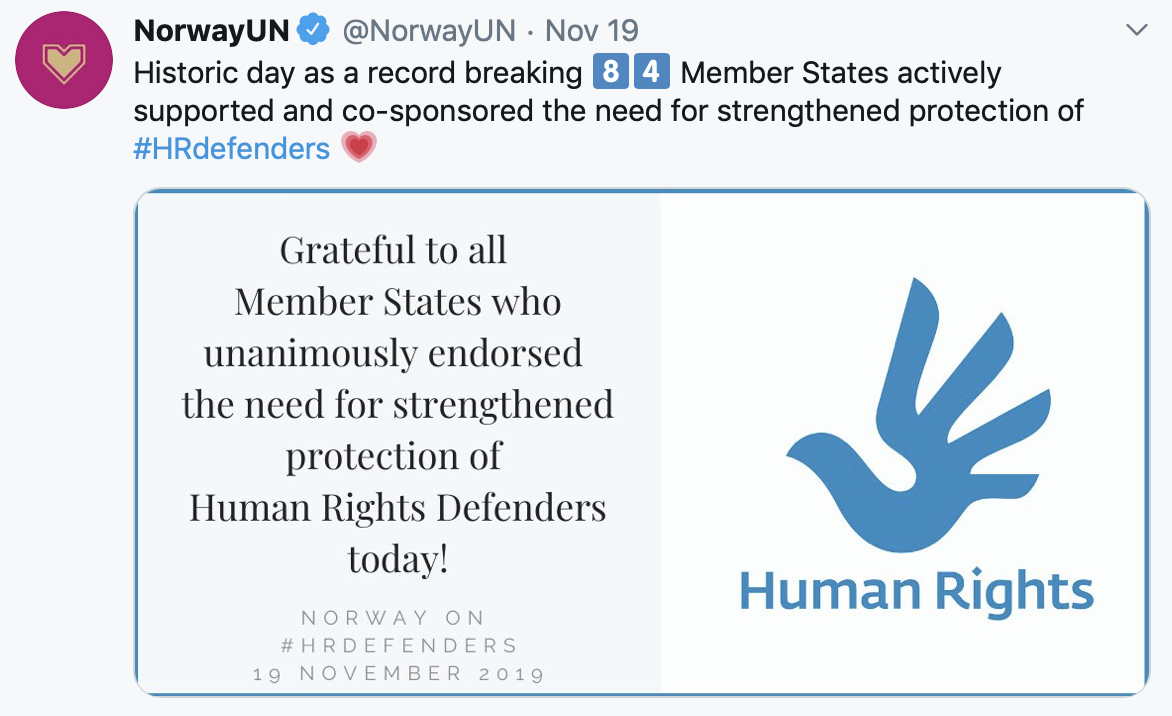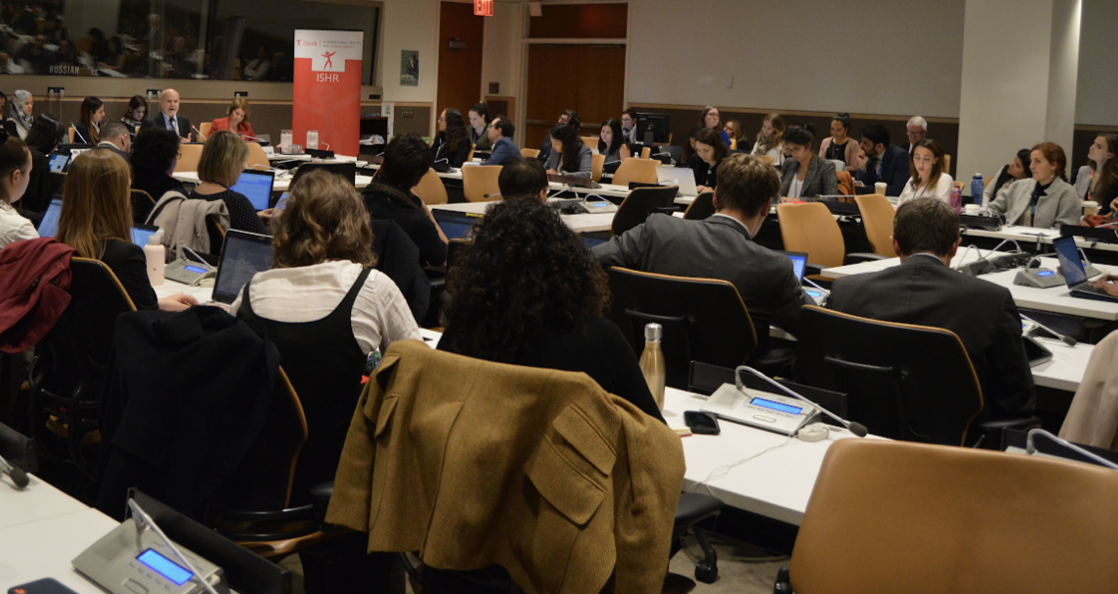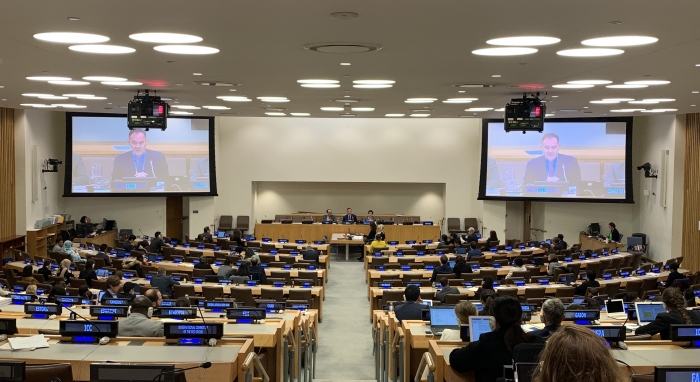Overview
Each October and November the Third Committe of the General Assembly provides an opportunity for member States in New York to take action to promote respect for human rights through the development and adoption of resolutions. These resolutions set out obligations, outline policy approaches and cite good practice in implementation. The Third Committee has just concluded its 2019 session. Once again this year, ISHR monitored the session closely, advocating for positive references to the right to defend rights and to enhance the effectiveness of the human rights systems.
Following weeks of negotiation, all States backed a resolution on human rights defenders – that attracted a record number of cosponsors – outlining key aspects of a human rights defender protection policy. A resolution building support for the work of independent, credible and effective National Human Rights Institutions also passed by consensus and we saw the first Third Committee joint statement on reprisals.
Member States heard from 44 independent experts and adopted 62 resolutions. They also considered the work of the Human Rights Council over the last year.
We outline below several key resolution negotiations and outcomes that ISHR followed closely. A joint civil society statement on the outcomes of the Third Commitee provides updates on other key outcomes of the session.
‘Now that these resolutions have been adopted the real work starts. These global agreements need to lead to real change on the ground,’ said ISHR’s Eleanor Openshaw. ‘States must start work on implementing these agreements immediately.’
This is also not the end of the road for these outcomes at the UN. Costs of activities and staffing included in these resolutions will be considered by the General Assembly’s Fifth Committee, the finance committee. All resolutions are then finally signed off on by the General Assembly Plenary in the second half of December.
This means States are still able to change their positions on resolutions before the final decision-making by the General Assembly Plenary. It is essential that we use this time now to push for increased support for outcomes.
Thematic Resolutions and Outcomes
Human rights defenders – The Norway-led resolution focuses on the implementation of the UN Declaration on Human Rights Defenders and effective protection policies. Negotiations over this text were tough. Norway took the approach that consolidation of key elements through a consensus text was a better approach than the call for a vote on a text containing more polarizing elements.
The final resolution contains key new elements related to protection policies in particular. For example, the resolution recognises the need for comprehensive risk assessments in its definition of protection measures, and for States ‘to address causes of attacks against defenders and barriers against the defence of rights.’ For the first time the General Assembly recognises the work of ‘environmental defenders’ and acknowledges threats to defenders, including from ‘cybercrime legislation’ – a first.
A record number of co-sponsors for a UN human rights defenders resolution – 84 – provides for a large group of States that must not only move swiftly to translate these policy commitments into practice (as should all States), but should all actively use opportunities of engagement with Third States to encourage them to do the same.

National human rights institutions – This biennial resolution led by Germany builds support for the work of independent, credible and effective National Human Rights Institutions (NHRIs) and their work promoting and protecting human rights. As in previous years, the resolution was adopted by consensus with the strong support of 91 States co-sponsoring, the highest ever number of co-sponsors for the resolution.
During negotiations challenges were made to references to ‘human rights defenders,’ despite this being agreed language, and to the inclusion of the term ‘intimidation’ in regard to the role NHRIs play in preventing and addressing cases of intimidation and reprisals. Strong support for these references, including by South Africa, Chile, the UK, the Netherlands and France, saw them preserved.
The resolution broke new ground by inclusion of reference to the Marrakesh Declaration, which provides for the expansion of civil society engagement and the protection of human rights defenders. The Declaration was recently adopted by NHRIs and emphasises both the important role of NHRIs in protecting human rights defenders and that NHRIs are themselves defenders worthy of protection.
Finally, whilst several States pushed for the exclusion of references to the Global Alliance of National Human Rights Institutions (GANHRI) – which pushes for the establishment of the highest standard NHRIs and represents more than 100 of them – these efforts were largely rebuffed.
Reprisals – Initiated by the United Kingdom and joined by a cross-regional group of 71 countries, the first Third Committee joint statement on reprisals called on all States and the UN to prevent, respond to, and ensure accountability for cases of intimidation and reprisals against those who engage or seek to engage with the UN. This welcome move was in line with the call made this September at the Human Rights Council (resolution 42/28) for the General Assembly to remain seized of all work in this area. This joint statement was an important first step towards enhanced dialogue on reprisals at the General Assembly.
For a discussion on the following thematic resolutions and outcomes see the joint civil society statement on outcomes of this session of the Third Committee:
- Safety of Journalists
- Terrorism and human rights
- Torture
- Human Rights to Safe Drinking Water and Sanitation
- Countering the use of information and communications technologies for criminal purposes
- Freedom of Religion or Belief
- Combating Religious Intolerance
- implementation of the Convention on the Rights of Persons with Disabilities
- Joint statement on human rights abuses in Xinjiang
Country-specific resolutions
Country-specific resolutions were once again among the most controversial presented to the Third Committee. A number of States, including Belarus, China, Myanmar, Russia, and Venezuela, continued to oppose country-specific resolutions and mandates across the board. Their common refrain was that singling out specific countries, when no State has a perfect human rights record, politicises human rights and undermines the legitimacy of the Third Committee. These States argued that the Human Rights Council’s Universal Periodic Review was the appropriate forum for discussing country situations. Notwithstanding this dialogue, the following four country-specific resolutions were adopted with broad support, sending the strong message that the concerned States urgently need to improve their human rights situations.
For a discussion on the following thematic resolutions see the joint civil society statement on outcomes of this session of the Third Committee:
- Islamic Republic of Iran
- Democratic People’s Republic of Korea (DPRK)
- Human rights abuses against Rohingya Muslims and other minorities in Myanmar
.png)
Interactive dialogues with mandate holders
Report of the Human Rights Council
Each year the UN Human Rights Council in Geneva sends a report to the General Assembly outlining decisions taken in the previous twelve months. Controversially, this report is considered first by the Third Committee in a resolution stating that the Third Committee ‘notes’ the Council report is presented by the African Group. This year Belarus called a vote on the resolution signaling their opposition to Council action on country situations, including on Belarus itself. The resolution passed.
Notably, the resolution was adopted without any challenge to the extension of the mandate of the Independent Expert on protection against violence and discrimination on the basis of Sexual Orientation and Gender Identity. In 2016 when the mandate of Independent Expert was created, an amendment challenging the creation was tabled at the Third Committee through the resolution presenting the Council report. This year, a record-high number of States supported the renewal of the mandate at the Human Rights Council in July, and the mandate was not challenged in the Third Committee. ‘This is a clear indication that the international community is becoming both more aware and less tolerant of violence and discrimination on the basis of SOGI,’ said ISHR’s Tess McEvoy.
‘It was not long ago that the words ‘sexual orientation’ and ‘gender identity’ could not even be uttered at the UN. The lack of challenge at the Third Committee is another significant step in the fight against violence and discrimination against LGBT persons,’ McEvoy added.
Report of other mandate holders
Various UN Special Procedures – Special Rapporteurs, independent experts, and working groups – reported to the Third Committee and held interactive ‘dialogues’ with member States. Several of this year’s reports reflect concerns about increased attacks on human rights defenders and emphasise the critical importance of creating and maintaining space for civil society. ISHR prepared analyses of those reports and the associated interactive dialogues:
As well as the High Commissioner for Human Rights.

ISHR Third Committee side events
End Impunity for human rights violations against human rights defenders
ISHR hosted a Third Committee side event in coordination with Amnesty International on Tuesday, 23 October entitled ‘End Impunity for human rights violations against human rights defenders’ Featured on the panel were Michel Forst, UN Special Rapporteur on Human Rights Defenders; Radya Al-Mutawakel, Mwatana Organization for Human Rights, Yemen; Khin Ohmar, Progressive Voice Myanmar, Myanmar. The discussion was moderated by Sherine Tadros from Amnesty International. The event provided an opportunity to discuss the report of the Special Rapporteur on the situation of human rights defenders that addressed impunity for human rights violations and abuses committed against human rights defenders. During the event challenges faced globally, and in particular in Myanmar and Yemen, regarding impunity were discussed. Recommendations regarding the implementation of international human rights commitments and obligations were also highlighted.
Venezuela on the brink: The urgency of an appropriate international response to the crisis
ISHR was pleased to participate in and co-sponsor an event on the human rights and humanitarian crisis in Venezuela, along with Amnesty International, Cepaz, CDH-UCAB, and the Global Centre for the Responsibility to Protect. In the discussion, ISHR presented reasons why Venezuela was an unfit candidate for membership of the Human Rights Council and should not get fellow States’ vote at Council elections to be held a fortnight later. The following day Costa Rica made the welcome move of announcing its candidacy, thereby injecting competition into the election for seats for the Latin American and Caribbean region.
Conclusion: dynamics at the Third Committee
1. For the first time in three years, members of the Commission of Inquiry on Burundi did not face threats from Burundi whilst delivering their report. The Chair of the Third Committee made clear that such behaviour would be unacceptable and successfully set the tone for a more respectful exchange. The initiative shown by the Chair to speak out to prevent reprisals against Special Procedures was greatly welcome.
2. The tactic of disassociation from paragraphs of resolutions that a particular State dislikes, has continued this session. For instance, Russia and the Philippines disassociated from paragraphs that reference the Rome Statute and the International Criminal Court in the resolution on torture. Moreover, a number of States, including Brazil, Chile, Hungary, and the United States, disassociated from all paragraphs that mention the Global Compact for Migration in the resolution on the protection of migrants. While it could be argued that this approach avoids the entire resolution being voted on, and alternatively isolates areas of contention. It undermines the value of the text and overall efforts to move consensus on human rights forward. We are dispirited to see this tactic being continually used.
3. In several negotiations States challenged progressive proposals on the basis that policy should not be ‘prescribed’. This is a variation of ‘sovereignty’ arguments advanced to limit global advances. Whilst it is true that States are constituted differently, and national internal arrangements will define exactly how agreements are implemented, this fact shouldn’t interfere with support of the policy proposal itself. Where a situation demands urgent action, for example, it is appropriate that States be ‘urged’ to act.
4. Challenges to references to gender, and sexual and reproductive health and rights were rife at this sessions of the Third Committee, similar to the previous two years. A number of resolutions were battlegrounds regarding references to gender, and sexual and reproductive health and rights. Some States, notably the United States, attempted to exclude all references to ‘sexual and reproductive health’ that they contend include the right to abortion. The attempts by the United States to remove references to sexual and reproductive healthcare and sexual education in the resolutions on The Girl Child and Improvement of the situation of women and girls in rural areas, those attempts were particularly intense in regard to the resolutions on the rights of the child and policies and programmes involving youth during the adoption of these resolutions the United States introduced several last minute hostile amendments, that were fortunately overwhelmingly rejected.
5. Finally, it is a source of ongoing frustration that civil society are not consistently welcome to attend informals as observers. Our direct experience of the human rights violations and abuses Third Committee seeks to address, and our expertise on the substance and history of UN resolutions, should mean civil society are treated as valuable partners. States should invite civil society to actively participate in informals as a matter of course, and speak up if their presence is challenged.
Contact:Tess McEvoy, [email protected]; Eleanor Openshaw, [email protected]
Photos: ISHR, Norway UN Twitter, UN Web TV, ISHR




.png)


